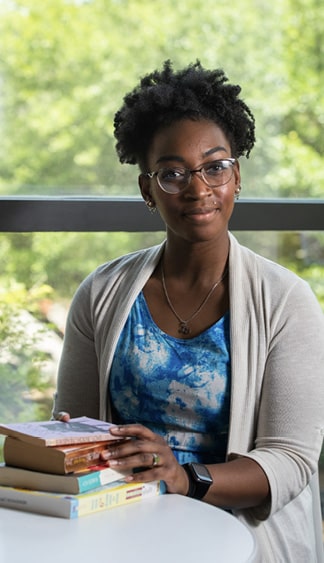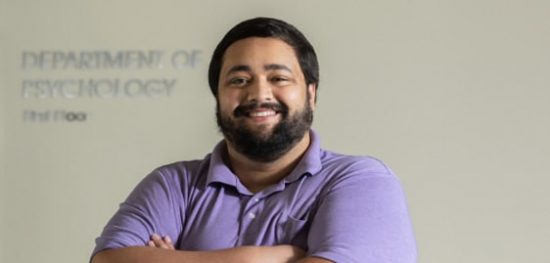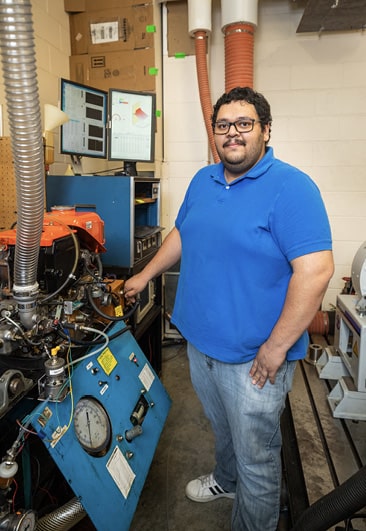2021 Averitt Award Winners
Four Graduate Students Receive Top Honor
Georgia Southern graduate students teach, grade assignments, run laboratories, conduct their own research, and write and publish complex papers. But too often their academic achievements go uncelebrated. Meet the four graduate students who won the Averitt Award this year. It is the highest honor presented to graduate students within the Georgia Southern University Jack N. Averitt College of Graduate Studies. The award recognizes excellence in two separate categories — instruction and research.
EXCELLENCE IN INSTRUCTION SCHOLARS

CYDNEY PRICE
Master of Arts Graduate, College of Arts and Humanities
Hometown: Kennesaw, Georgia
Major: English Literature
What did you teach?
World Literature II to mostly sophomores, although I had some of everyone in my classes.
What did you enjoy about teaching?
One of my favorite things about teaching so far is discovering that each one of my students is absolutely brilliant. They each come from different backgrounds and with different skill sets, so seeing them come together and interpret texts in the ways they do is amazing. Also, it’s always so encouraging when I get the privilege to teach them something they’ll remember for the rest of their lives. They teach me just as much as I teach them, and I couldn’t see myself doing anything else.
What did you learn about yourself at Georgia Southern?
I learned that I love teaching. Before graduate school, I never thought I wanted to be lecturing in front of students. After stepping one foot in my classroom, I knew I was supposed to be a teacher.
Describe your Georgia Southern experience.
It’s been fun in a lot of ways, challenging in others. I’m sad to leave the place that’s been my home for six years, but I’m much more excited to see what my mid-20s has in store for me.
What does it mean to you to be a recipient of the Averitt Award?
It was an honor to even find out I was nominated for the award. Being formally recognized for something you love doing is incredibly rewarding. Teaching is so much a part of my life now that it feels odd to be awarded for it, but also really, really great.
What are your career plans?
I plan to join the 2021 Teach for America corps. I will be teaching 6th grade English Language Arts with this organization.

BRADLY MCGINNIS
Master of Science Graduate, College of Behavioral and Social Sciences
Hometown: Columbus, Georgia
Major: Experimental Psychology
What did you teach?
Research and Analysis 1 and Introduction to Psychology
What did you enjoy about teaching?
I’ve enjoyed seeing the moments when a student has learned a new concept. Watching them make connections to other material and to their own lives is a wonderful experience. Watching my students apply themselves and grow in their understanding has been the greatest experience in teaching.
What did you learn about yourself at Georgia Southern?
I learned that I love teaching. I come from a long line of teachers in my family, and I was surprised to learn I loved it too. I’ve learned that I love helping others succeed at their goals in the classroom and in their academic careers. I’ve also learned that I love to bake as well.
Describe your Georgia Southern experience.
My Georgia Southern experience has been absolutely incredible. The amount of opportunities that are available here is astounding. I made sure that in my two years here I took every opportunity that was out there, and I have definitely grown from it. I couldn’t have asked for a better school to attend.
What does it mean to you to be a recipient of the Averitt Award?
It was such a surprise to learn that I won, and I am honored to have even been nominated by the department. Everything I do is for my students, and I cannot thank everyone who helped get me here enough. I am proud to be a lecturer at Georgia Southern.
What are your career plans?
I am working toward getting my Ph.D. in clinical psychology so that I can be a clinician in the future.
EXCELLENCE IN RESEARCH SCHOLARS

CESAR CARAPIA
Master of Science Graduate, Allen E. Paulson College of Engineering and Computing
Hometown: Douglasville, Georgia
What is the focus of your research?
To reduce the emissions emitted from diesel engines through the use of advanced combustion techniques and bio-fuels.
What did you learn about yourself at Georgia Southern?
My tenacity to keep moving forward even in the face of great adversity.
Describe your Georgia Southern experience.
My Georgia Southern experience has been great, not only was I able to develop professionally thanks to my research mentor Dr. Valentin Soloiu, but also as a person through the friendships I made while here.
What does it mean to you to be a recipient of the Averitt Award?
It means a lot to be recognized for my work as it shows how far I have come from my humble beginnings. It means a lot to my family as well knowing that the hard work we put in to get me where I am today has started to bear fruit.
What are your career plans?
To become a great engineer in the automotive industry, and make an impact on society by creating safer and environmentally friendlier vehicles that are still fun to drive.

ERIN ARNESON
Master of Science Graduate, College of Science and Mathematics
Hometown: Chippewa Falls, Wisconsin
What is the focus of your research?
The goal of my graduate research was to investigate the response of Oculina arbuscula to ocean acidification in the live-bottom reef ecosystem of coastal Georgia. Oculina arbuscula is a branching coral native to the Georgia coast and Gray’s Reef National Marine Sanctuary (GRNMS). This coral species plays an important role in the ecosystem, providing structural complexity to the reef housing nursery fish, crabs and other invertebrates. Using seawater chemistry data from the GRNMS monitoring program and elements trapped in the coral skeletons as they grow, I attained further data about the calcification process of O. arbuscula and how they are able to cope with current acidic conditions on the Georgia coast.
What did you learn about yourself at Georgia Southern?
Climate change, which is driven by excess carbon dioxide in our atmosphere, has been buffered by our oceans over the past 200 years. The ocean has absorbed ~30% of all CO2 released from burning fossil fuels since the industrial revolution. The global change in seawater chemistry because of this absorption is known as ocean acidification. Ocean acidification is intensified by runoff pollution, deforestation and a number of other human induced factors, putting many marine organisms, ecosystems and the communities of people who depend on them at risk. Researching a topic deeply rooted in the human-environment connection has challenged me to learn about my values as a part of this interconnected web.
Describe your Georgia Southern experience.
My experience in the biology program at Georgia Southern was positive first and foremost because of the friendships I made within the graduate student community. I am thankful for their support; for proofreading grant proposals, for helping me through setbacks, and for creative outlets like Dungeons and Dragons campaigns. I cannot stress enough the importance of community among graduate students.
What does it mean to you to be a recipient of the Averitt Award?
I am extremely grateful for the recognition of my research efforts. My research pursuits over the past three years stemmed from my commitment to protect the ecosystems of the Georgia coast, passion for ocean conservation and aspiration to educate future ocean stewards. The honor of receiving the Averitt Award has encouraged my future goals for using ocean acidification research to engage individuals with the health of their environment for the prosperity of communities and the earth.
What are your career plans?
My career goal is to utilize the science and communication skills gained as a graduate student at Georgia Southern to help build ecosystem and community resilience on our coast.
